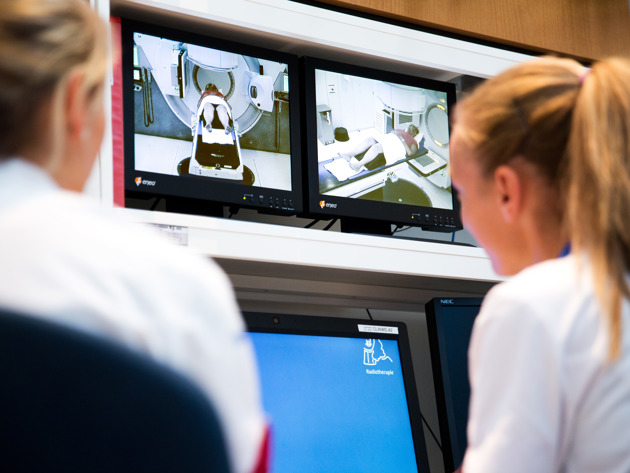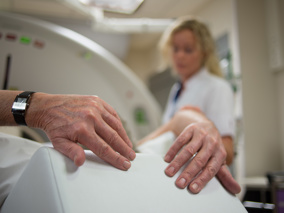Penile cancer
Penile cancer is cancer of the penis. This type of cancer usually develops at the foreskin or glans (glans). Penile cancer is rare. In the Netherlands, about 150 men a year get penile cancer. It mainly occurs in men over the age of 60, but younger men can also develop penile cancer or a precancerous stage.
On this page you can read more about the symptoms, examinations and treatments for penile cancer.
Also visit our urology department and read more about our working method and specialists.
Learn more about penile cancer
Causes of penile cancer
Penile cancer is more common in men with a tight foreskin. If the foreskin is too tight, you won't be able to clean the glans properly. As a result, you are more likely to get an inflammation of the glans or foreskin. Sometimes that inflammation keeps coming back, or it doesn't go away. This increases the risk of penile cancer.
The main risk factors for penile cancer are:
- the human papillomavirus (HPV)
- narrowed foreskin
- poor hygiene / long-term inflammation of the glans
- smoke
- The skin condition Lichen Sclerosus
Human papillomavirus (HPV)
There are about 100 types of HPV. Most are harmless, but some increase the risk of cancer. HPV is best known for cervical cancer, but it also plays a role in anal cancer, labia cancer and penile cancer (this is usually HPV type 16 or 18). HPV can also cause cancer in the mouth or throat. Benign abnormalities such as genital warts are often caused by HPV type 6 or 11.
HPV and penile cancer
More than 80% of people who are sexually active will develop HPV sooner or later. Usually the immune system clears the virus itself within two years. Sometimes that doesn't happen. The virus can then cause cancer after years, such as penile cancer. About 30–50% of penile cancer diagnoses are due to HPV. So not everyone who gets penile cancer also has HPV. You can discuss with your doctor whether you should have yourself and your partner tested. In most cases, the treatment is the same.
Symptoms of penile cancer
Penile cancer often starts with skin conditions on the penis. This can be a red spot, wart, or sore that persists. Usually the condition is on the glans or under the foreskin. Always have the spot examined if it does not go away or if it grows. Not all abnormalities on the penis are malignant. Sometimes a biopsy is needed to determine if it is malignant. Then you will be referred to an expertise centre.
Other signs and symptoms of penile cancer:
- secession
- pain in the erectile tissue of the penis
- scabs or red rash under the foreskin or on the glans
- recurrent inflammation of the glans
- blood loss
- a nasty smell
Pre-stage of penile cancer
Cancer does not develop suddenly. Usually it takes years. A tumor starts as a small group of abnormal cells (this is called a preliminary stage). In penile cancer, this is called pre-stage PeIN (penile intraepithelial neoplasia). This preliminary stage is also called PIN, Bowen or Queyrat.
PeIN can be on the glans or under the foreskin. Pre-stages can sometimes disappear without traces. About 30% of people with PeIN do develop penile cancer. That is why we recommend treating PeIN. This can be done with creams, laser treatment, surgery, circumcision, or a combination. These treatments are available at the Netherlands Cancer Institute.
Types of penile cancer
Penile cancer usually originates in skin cells. Squamous cells are located in the lower layer of the skin. If the tumor develops there, we call it squamous cell carcinoma. This occurs in 95% of penile cancers. Very occasionally there are other types, such as basal cell carcinoma, sarcoma, adenocarcinoma or melanoma. The expectation (prognosis) differs per species. Your urologist can tell you more about it.
Metastases in penile cancer
Penile cancer can metastasize, usually first to the lymph nodes in the groin. That is why we always make an ultrasound of the groin. If we see a suspicious lymph node, we sometimes take a needle biopsy.
If the cancer is only in the penis, the chance of recovery is high. In the case of metastases in lymph nodes, the prognosis is less favourable. This depends on how many glands cancer cells have been found in, and whether they are only in the groin or also in the pelvis. If the disease is limited to a few glands in the groin, the outlook is still good. After 5 years, about 70% of patients are alive. If the metastases are in the pelvis or grow outside the glandular capsule, the prognosis is worse.
Why choose the NKI?
Expertise
The NKI is the only recognized expertise center for penile cancer in the Netherlands.
Penis-sparing treatment
We have a lot of experience with penis-sparing treatments and reconstructions.
Detecting metastases
We have a lot of experience with the sentinel lymph node procedure. This is a technique to detect any metastases early and with few side effects.
Research and care
Research and care under one roof. You will always receive care according to the latest insights, with the possibility of new treatments. You will receive tailor-made advice from us.
Treatment options
We offer all possible treatment options.
Quality
Quality of care that is among the best worldwide, given the survival rates.
Supportive care
Attention is also paid to supportive care, such as lymphedema therapy, psychological help and rehabilitation.
-
968
-
192
Waiting
We want to inform you as well as possible about the waiting time per condition. We do this based on a prognosis of the current waiting list. The waiting time can vary from patient to patient for various reasons. Your attending physician will give you more information during your outpatient consultation.
-
18 days
First appointment
This is approximately how long it will take until you have your first appointment
-
11 days
Rapid diagnostics
This is approximately how long it will take before you can start rapid diagnostics at the NKI. You will have an appointment with your urologist and nurse practitioner on the same day. If necessary, you will also have an ultrasound of the groin, biopsy, and a consult with your anesthesiologist.
Other relevant websites

 nl
nl





